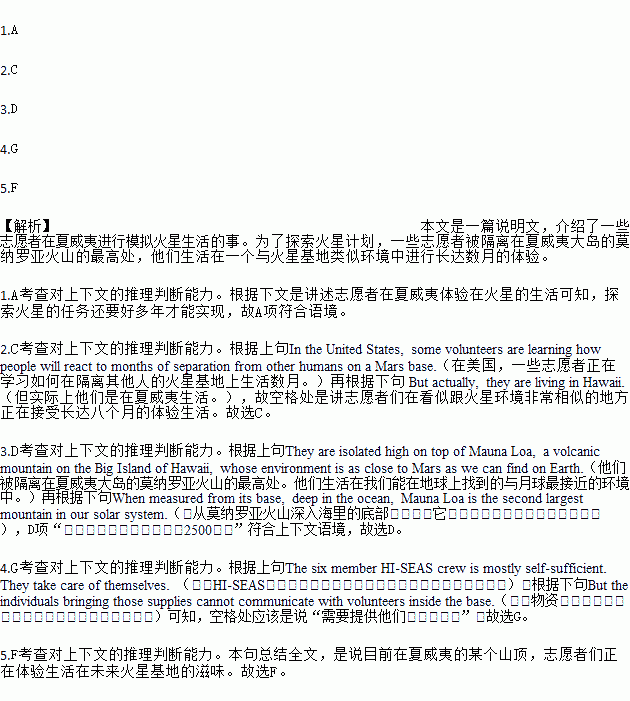题目内容
根据短文内容,从短文后的选项中选出能填入空白处的最佳选项。选项中有两项为多余选项。
For generations, people have dreamed of traveling to Mars to explore Earth’s closest planetary neighbor. The American Space Agency, NASA, and other space agencies have announced plans to send people to the Red Planet.1..
In the United States, some volunteers are learning how people will react to months of separation from other humans on a Mars base.2. But actually, they are living in Hawaii. The project is called HI-SEAS. NASA has provided financial support for the work.
Six people are living on a make-believe Mars Base. They are isolated high on top of Mauna Loa, a volcanic mountain on the Big Island of Hawaii, whose environment is as close to Mars as we can find on Earth. 3. When measured from its base, deep in the ocean, Mauna Loa is the second largest mountain in our solar system. Because it is so high, the land is not warm or rich with plants, like the rest of Hawaii. Visually, it is very similar to what you see on Mars. They can walk across red lava rock from the volcano and see the wonderful volcanic material. There is really no visible plant life or animal life.
The six member HI-SEAS crew is mostly self-sufficient. They take care of themselves.4.
But the individuals bringing those supplies cannot communicate with volunteers inside the base. The current crew has been living in the base since October, and will stay until June. Crew members communicate with the outside world through e-mail and blogs. They also produce videos on the YouTube website.5.
Food and supplies are brought to them.
A. But such a manned mission is years away.
B. Mars has the largest volcanic mountain in the solar system.
C. They are spending eight months in an area that looks much like the surface of Mars.
D. Mauna Loa is 2,500 meters above sea level.
E. Conditions on the surface of Mars are closer to the conditions on Earth.
F. For now, on a mountaintop in Hawaii, volunteers are getting a taste of life on a future Mars base.
G. Food and supplies are brought to them.

